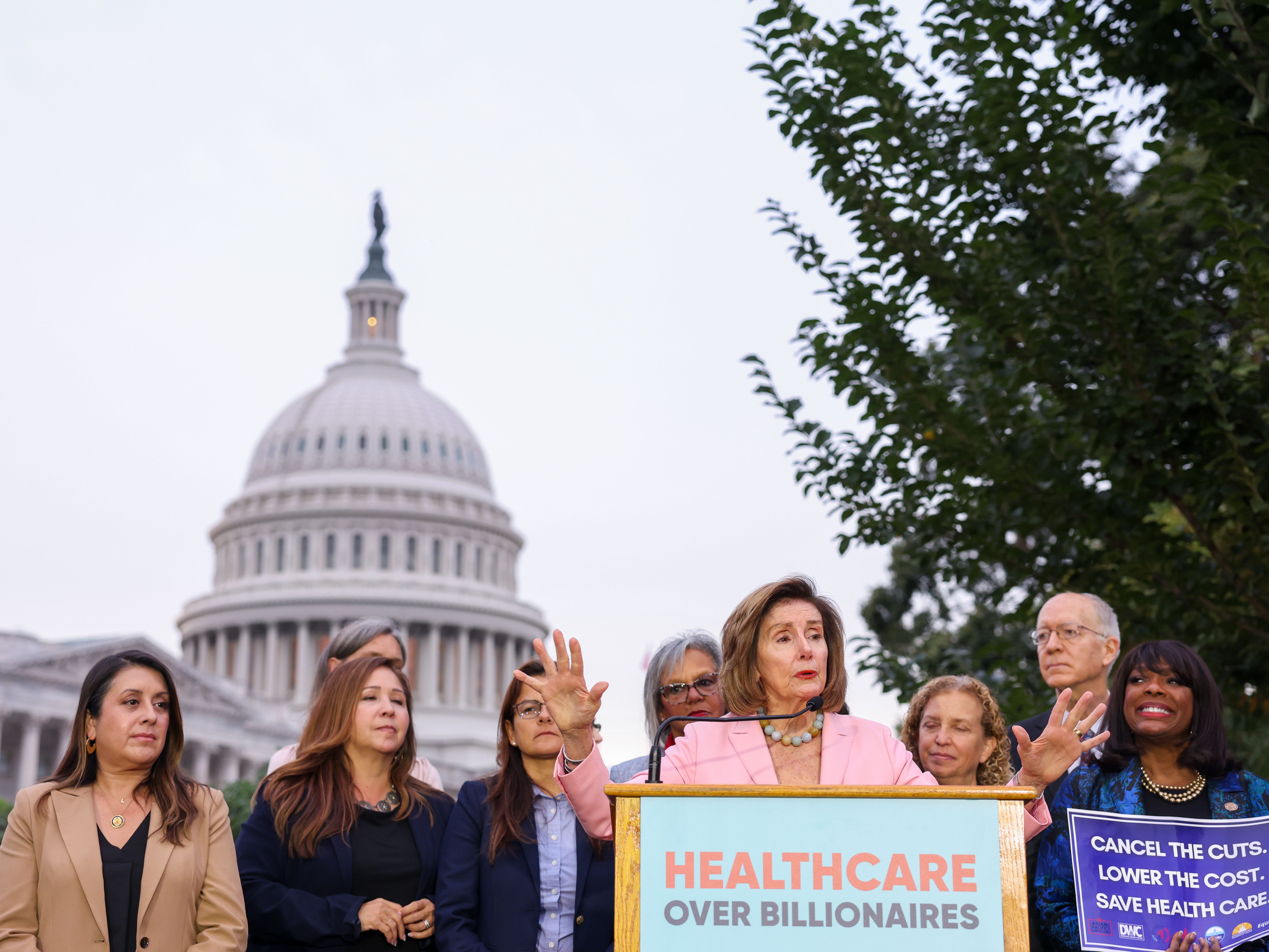
Tasos Katopodis/Getty Images for Fair Share America
- Healthcare spending is at the center of this week’s government shutdown.
- Democrats and Republicans are split on funding Affordable Care Act subsidies and Medicaid.
- If subsidies lapse, over 20 million Americans could face higher health insurance costs.
Affordable Care Act subsidies and Medicaid are hot topics central to Congress’ latest budget negotiations, and they were left unresolved at 12:01 a.m. on Wednesday morning.
Expanded Affordable Care Act tax credits are set to expire at the end of the year, which could cause Marketplace insurance premiums to balloon. Democrats are calling for the credits — which were first passed by Congress during the pandemic — to be extended. They warn that, if the current spending bill that the House passed on September 19 goes through the Senate as is, health insurance could be disrupted for millions of Americans.
“What we’re doing is meeting the healthcare needs of the American people,” Speaker Emerita Nancy Pelosi told reporters this week.
President Donald Trump and fellow Republicans called for the government to remain open in the hours before the shutdown, including in an email sent to federal workers on Tuesday that said “Democrats are blocking this Continuing Resolution in the U.S. Senate due to unrelated policy demands.”
In addition to healthcare, consumers are set to feel the impact, like delays at airports and potential disruptions at national parks. Federal employees are also waiting to learn if they’re furloughed, fired, or have to work without pay until a funding deal passes through Congress.
Have a tip? Contact this reporter via Signal at alliekelly.10 or email [email protected]. Use a personal email address, a nonwork WiFi network, and a nonwork device; here’s our guide to sharing information securely.
Congress could limit ACA credits and keep Medicaid cuts
Lower- and middle-income Americans on government health coverage could feel the brunt of the Republicans’ proposed budget bill. The US spends hundreds of billions of dollars on Medicaid and Affordable Care Act plans each year. The One Big Beautiful Bill passed earlier this year included deep cuts to that spending.
The enhanced ACA tax credits increased the level of financial assistance Marketplace enrollees could receive. The credit also allowed middle-income Americans at 400% of the poverty line (which is an annual income of $128,600 for a family of four) to claim relief on healthcare costs. In the past decade, Marketplace insurance enrollment has jumped from 11 to over 24 million.
A KFF analysis shows that, without these credits in place, the lower- and middle-income Americans on ACA plans could see their out-of-pocket premium costs at least double in 2026. Depending on their income level, some enrollees would see their tax credit shrink and others would be disqualified entirely.
“Democrats shut down the federal government because President Trump and Republicans refused to give free healthcare to illegal aliens,” White House Press Secretary Karoline Leavitt wrote on X Wednesday morning. Undocumented immigrants have never been eligible for ACA subsidies and do not qualify for most Medicaid plans.
Alongside campaigning for the ACA tax credit extension, Democrats are demanding that Republicans reverse the Medicaid cuts outlined in Trump’s spending plan, which was signed into law in July. Though the Medicaid threshold varies by state, most recipients have incomes near the poverty line.
The president’s plan calls for new Medicaid qualification requirements, which would require non-exempt Americans to work 80 hours a month to qualify for insurance. The law also limits the amount of money states can funnel from provider taxes toward Medicaid. In practice, this means that hospitals — especially those in rural areas — will lose funding and some Medicaid recipients will experience higher out-of-pocket costs.
Without changes in October’s spending bill, the Trump Administration’s changes to the ACA tax credits and Medicaid will go into effect between early 2026 and early 2027. The president also introduced TrumpRx.com this week, a government-run prescription drug platform.
It’s unclear when the government will reopen. Recent shutdowns have lasted anywhere from a few hours to 35 days.
The White House, and representatives for Senate Majority Leader John Thune, Senate Minority Leader Chuck Schumer, House Minority Leader Hakeem Jeffries, and House Speaker Mike Johnson did not immediately respond to Business Insider’s request for comment.
Read the original article on Business Insider
The post Why healthcare coverage for millions of Americans is at the heart of the government shutdown appeared first on Business Insider.




